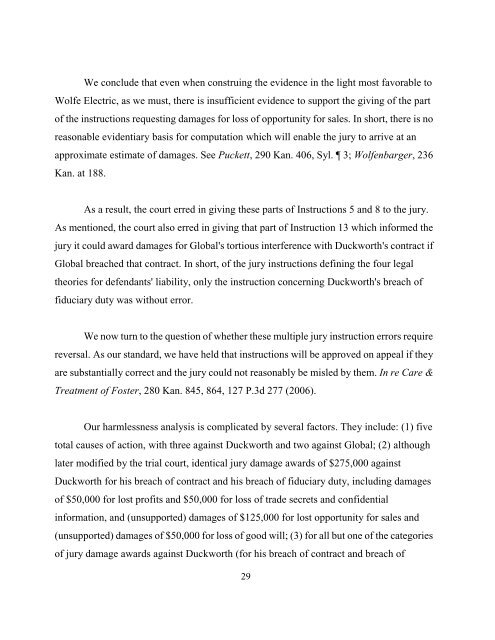Kansas Supreme Court - 99536 â Wolfe Electric, Inc. v. Duckworth
Kansas Supreme Court - 99536 â Wolfe Electric, Inc. v. Duckworth
Kansas Supreme Court - 99536 â Wolfe Electric, Inc. v. Duckworth
You also want an ePaper? Increase the reach of your titles
YUMPU automatically turns print PDFs into web optimized ePapers that Google loves.
We conclude that even when construing the evidence in the light most favorable to<br />
<strong>Wolfe</strong> <strong>Electric</strong>, as we must, there is insufficient evidence to support the giving of the part<br />
of the instructions requesting damages for loss of opportunity for sales. In short, there is no<br />
reasonable evidentiary basis for computation which will enable the jury to arrive at an<br />
approximate estimate of damages. See Puckett, 290 Kan. 406, Syl. 3; <strong>Wolfe</strong>nbarger, 236<br />
Kan. at 188.<br />
As a result, the court erred in giving these parts of Instructions 5 and 8 to the jury.<br />
As mentioned, the court also erred in giving that part of Instruction 13 which informed the<br />
jury it could award damages for Global's tortious interference with <strong>Duckworth</strong>'s contract if<br />
Global breached that contract. In short, of the jury instructions defining the four legal<br />
theories for defendants' liability, only the instruction concerning <strong>Duckworth</strong>'s breach of<br />
fiduciary duty was without error.<br />
We now turn to the question of whether these multiple jury instruction errors require<br />
reversal. As our standard, we have held that instructions will be approved on appeal if they<br />
are substantially correct and the jury could not reasonably be misled by them. In re Care &<br />
Treatment of Foster, 280 Kan. 845, 864, 127 P.3d 277 (2006).<br />
Our harmlessness analysis is complicated by several factors. They include: (1) five<br />
total causes of action, with three against <strong>Duckworth</strong> and two against Global; (2) although<br />
later modified by the trial court, identical jury damage awards of $275,000 against<br />
<strong>Duckworth</strong> for his breach of contract and his breach of fiduciary duty, including damages<br />
of $50,000 for lost profits and $50,000 for loss of trade secrets and confidential<br />
information, and (unsupported) damages of $125,000 for lost opportunity for sales and<br />
(unsupported) damages of $50,000 for loss of good will; (3) for all but one of the categories<br />
of jury damage awards against <strong>Duckworth</strong> (for his breach of contract and breach of<br />
29
















